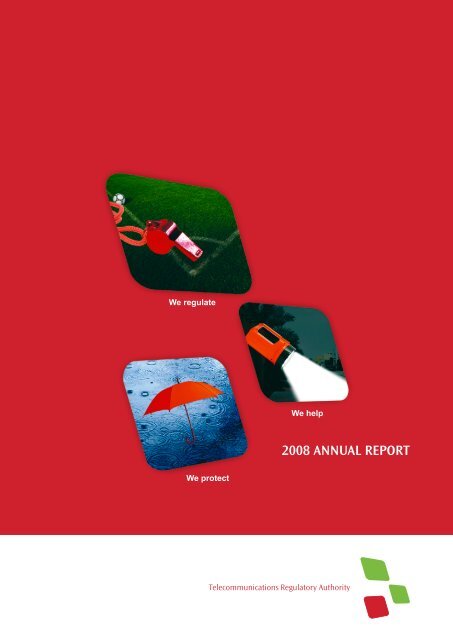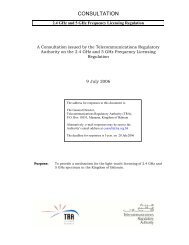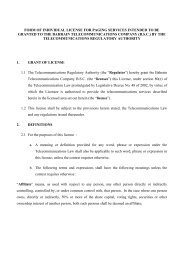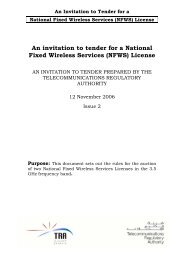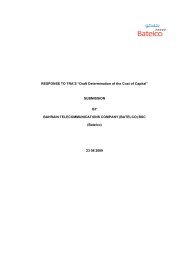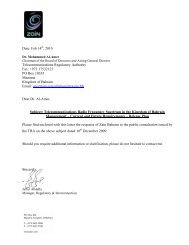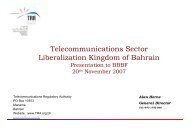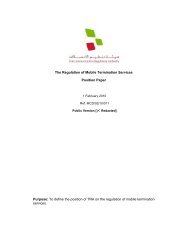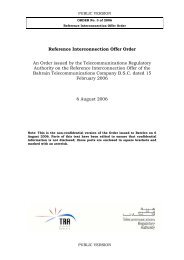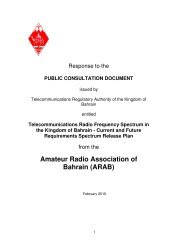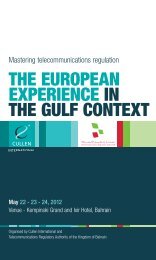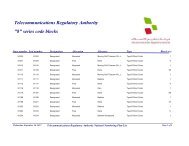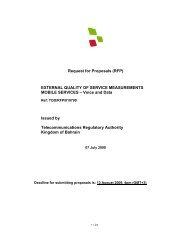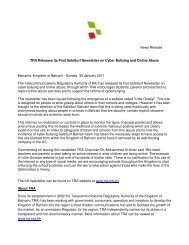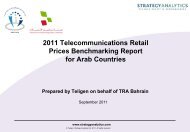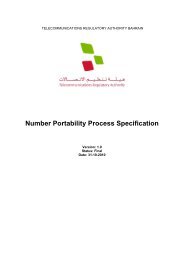Annual Report 2008 - TRA - Telecommunication Regulatory Authority
Annual Report 2008 - TRA - Telecommunication Regulatory Authority
Annual Report 2008 - TRA - Telecommunication Regulatory Authority
You also want an ePaper? Increase the reach of your titles
YUMPU automatically turns print PDFs into web optimized ePapers that Google loves.
We regulate<br />
We help<br />
<strong>2008</strong> ANNUAL REPORT<br />
We protect
H. H. Shaikh Khalifa Bin Salman Al Khalifa<br />
The Prime Minister<br />
H. M. King Hamad Bin Isa Al Khalifa<br />
The King of Bahrain<br />
H. H. Shaikh Salman Bin Hamad Al Khalifa<br />
The Crown Prince & Deputy Supreme<br />
Commander of the BDF
OUR VISION<br />
To develop the Kingdom of Bahrain as the<br />
region’s most modern communications hub<br />
and to facilitate the development of the<br />
telecommunications market.<br />
OUR MISSION<br />
To protect the interests of subscribers and<br />
users of telecommunications services as well as<br />
maintain effective and fair competition between<br />
established service providers and new entrants to<br />
the telecommunications market of the<br />
Kingdom of Bahrain.
CONTENTS<br />
Board of Directors 2<br />
The <strong>Telecommunication</strong>s <strong>Regulatory</strong> <strong>Authority</strong> (<strong>TRA</strong>) 3<br />
Chairman’s Statement 4<br />
General Director’s Statement 6<br />
Highlights of <strong>2008</strong> 10<br />
Working for Consumers 12<br />
The New Advisory Bodies 13<br />
The Consumer Advisory Group 13<br />
The Business Users Advisory Group 14<br />
Network Security 14<br />
International Roaming Tariffs 14<br />
Retail Tariffs 14<br />
Quality of Services 15<br />
Registration of Prepaid Mobile Subscriber Details 15<br />
Consumer Complaints 15<br />
Building a Competitive Market 16<br />
The Second National <strong>Telecommunication</strong>s Plan 17<br />
Strategic and Retail Market Review 17<br />
Third Mobile Licence 18<br />
Local Loop Unbundling 19<br />
Competition Guidelines 19<br />
Number Portability 19<br />
National Numbering Plan 20<br />
Spectrum Issues 20<br />
Interconnection - the Wholesale Offer 21<br />
<strong>Telecommunication</strong>s Infrastructure 22<br />
Enforcement Actions 23<br />
Licensing 24<br />
Licence Fees 24<br />
Mergers and Acquisitions 24<br />
Market Indicators and Statistics 25<br />
Forging Links 28<br />
International 29<br />
Local 30<br />
Inside <strong>TRA</strong> 32<br />
Statement of Accounts 34<br />
Annexes 38
2<br />
<strong>TRA</strong> <strong>Annual</strong> <strong>Report</strong> <strong>2008</strong><br />
Board of Directors<br />
02<br />
BOARD OF<br />
DIRECTORS<br />
The Board of the <strong>Telecommunication</strong>s <strong>Regulatory</strong> <strong>Authority</strong> (<strong>TRA</strong>) is appointed by His Majesty the King, Hamad bin<br />
Isa bin Salman Al Khalifa, following a proposal from the Council of Ministers of the Kingdom of Bahrain.<br />
At the end of <strong>2008</strong> the Board was as follows:<br />
Dr. Mohammed Ahmed Al Amer<br />
Chairman<br />
Shaikh Hamad bin<br />
Mohammed bin Hamad<br />
Al Khalifa<br />
Dr. Taqi Abdul Rasool Al Zeera Colonel Riyadh Eid Abdulla Mr. Tariq Abdul Jalil Al Saffar
The <strong>Telecommunication</strong>s <strong>Regulatory</strong> <strong>Authority</strong> (<strong>TRA</strong>)<br />
<strong>TRA</strong> <strong>Annual</strong> <strong>Report</strong> <strong>2008</strong> 3<br />
03<br />
AUTHORITY<br />
THE TELE-<br />
COMMUNICATIONS<br />
REGULATORY<br />
(<strong>TRA</strong>)<br />
<strong>TRA</strong> was set up in October 2002 by Legislative Decree No. 48 under the <strong>Telecommunication</strong>s Law. <strong>TRA</strong> is an independent<br />
body overseen by the Board of Directors. The General Director of <strong>TRA</strong> is responsible for the day-to-day operation<br />
of the authority. The General Director is appointed by His Majesty the King, Hamad bin Isa Al Khalifa, based on the<br />
recommendation of the Board of Directors of <strong>TRA</strong> and the proposal of the Council of Ministers, and following the<br />
approval thereof by the Council of Ministers. In December 2006, Mr. Alan Horne was selected as <strong>TRA</strong> General Director,<br />
and was formally appointed in March 2007 by His Majesty the King, Hamad bin Isa Al Khalifa.<br />
The duties of <strong>TRA</strong> include protecting the interests of subscribers and users of telecommunications services and<br />
maintaining effective and fair competition between established operators and new entrants to the telecommunications<br />
market in the Kingdom of Bahrain.<br />
<strong>TRA</strong> carries out its duties and exercises its powers in a fair, transparent and non-discriminatory manner.<br />
BOARD OF DIRECTORS<br />
General Director<br />
Deputy<br />
General Director<br />
Communications &<br />
Consumer Affairs<br />
Director<br />
Technical & Operations<br />
Director<br />
Legal Affairs<br />
Director<br />
Market & Competition<br />
Director<br />
Finance & Administration<br />
Director<br />
Consumer Affairs<br />
Manager<br />
Licensing &<br />
Operations Manager<br />
Technical<br />
Advisor<br />
<strong>Telecommunication</strong><br />
Access & Infrastructure<br />
Manager<br />
ICT<br />
Manager<br />
Market & Competition<br />
Manager<br />
Chief Economist
4<br />
<strong>TRA</strong> <strong>Annual</strong> <strong>Report</strong> <strong>2008</strong><br />
Chairman’s Statement<br />
04<br />
CHAIRMAN’S<br />
STATEMENT<br />
Welcome to the sixth<br />
annual report of <strong>TRA</strong> - the<br />
<strong>Telecommunication</strong>s <strong>Regulatory</strong><br />
<strong>Authority</strong> of the Kingdom<br />
of Bahrain. During <strong>2008</strong><br />
we began to put in place<br />
measures that will equip us<br />
to meet our objectives and<br />
face the challenges ahead as<br />
the telecommunications landscape changes rapidly on both a<br />
national and global scale.
Chairman’s Statement<br />
<strong>TRA</strong> <strong>Annual</strong> <strong>Report</strong> <strong>2008</strong> 5<br />
<strong>TRA</strong> can be proud of what it has achieved since the seeds of liberalisation were sown in 2002, and I would like<br />
to thank Dr. Mohammed bin Jassim Al Ghatam and the previous Board Members for their active participation in<br />
shaping the Kingdom’s telecommunications market. However, we still have more to do in realising our vision of<br />
Bahrain as the region’s most modern communications hub and in reaching our potential in comparison to the most<br />
advanced markets in the world.<br />
When the new Board met for the first time in June, I spoke on behalf of all the Members when I said that we were<br />
pleased and honoured to be entrusted with leading <strong>TRA</strong> in the coming four years. This will be a critical time as our<br />
competitive telecommunications market matures and delivers real benefits for users, for operators and for our<br />
economy in the Kingdom.<br />
The second National <strong>Telecommunication</strong>s Plan published at the beginning of the year set out the Government’s<br />
high level objectives for the next three years. <strong>TRA</strong> must continue to remove barriers to competition, including those<br />
in building competing infrastructure. We must encourage inward investment and use scarce resources, such as<br />
spectrum and access to land, with maximum economic efficiency. We need to work with both residential and business<br />
customers in developing the regulatory framework, addressing their concerns and meeting their expectations. We<br />
will promote the use of broadband and internet services, and ensure that the regulatory framework keeps pace with<br />
converging and new technologies.<br />
The activities and progress outlined in this report reflect our commitment to meeting the Plan’s objectives. We are<br />
well on the way to implementing the measures resulting from the comprehensive study of the market carried out<br />
in 2007 – the Strategic and Retail Market Review – which fully support the Government’s aims. <strong>TRA</strong> is working with<br />
more partners than ever before to deliver greater benefits for customers and for our country.<br />
There is no doubt that, with the downturn in the global economy, 2009 will be a difficult year for attracting further<br />
investment into our communications market. However, I am certain that <strong>TRA</strong> will continue to make progress. When<br />
members of the Kingdom of Bahrain’s excellence programme, which aims to promote a culture of excellence in<br />
performance across the public and private sectors, visited in November they recognised that <strong>TRA</strong> always pursues<br />
high standards of performance and adopts international best practice. This approach equips <strong>TRA</strong> and its staff to<br />
tackle the future with confidence.<br />
Dr. Mohammed Ahmed Al Amer
6<br />
<strong>TRA</strong> <strong>Annual</strong> <strong>Report</strong> <strong>2008</strong><br />
General Director’s Statement<br />
06<br />
GENERAL<br />
DIRECTOR’S<br />
STATEMENT<br />
The theme of our work at <strong>TRA</strong><br />
this year has been putting in<br />
place the right measures to<br />
boost competition in a maturing<br />
market so we can realise the<br />
maximum benefits for both<br />
consumers and the economy<br />
over the years ahead. Following<br />
the comprehensive Strategic<br />
and Retail Market Review<br />
completed in <strong>2008</strong> and the publication of the Government’s<br />
National <strong>Telecommunication</strong>s Plan in <strong>2008</strong>, we have a clear<br />
roadmap for the future and we are in good shape to tackle the<br />
challenges that face us.
General Director’s Statement<br />
<strong>TRA</strong> <strong>Annual</strong> <strong>Report</strong> <strong>2008</strong> 7<br />
First I would like to take this opportunity of thanking the Chairman, Dr. Mohammed Ahmed Al Amer, and the Board for<br />
their support and active interest in the work of <strong>TRA</strong>. I know that they share my optimism for the telecommunications<br />
market in the Kingdom and its potential in the long term, despite the current global economic situation.<br />
The outcome of the Strategic and Retail Market Review - a major piece of work for <strong>TRA</strong> last year - resulted in nine<br />
measures to further enhance the competitive environment, encourage investment in alternative services and improve<br />
the user experience. These ranged from offering a third mobile licence and introducing number portability to<br />
enhancing data collection and issuing competition guidelines. Excellent progress was made on a number of these<br />
measures during <strong>2008</strong>.<br />
Some of the measures, such as reforming and relaxing tariff regulation, call for a more mature relationship both<br />
between <strong>TRA</strong> and licensed operators, and between the operators themselves. We are drawing up competition<br />
guidelines that will pave the way for the transition to this more devolved approach. In particular, as the regulator, we<br />
need to be confident that Batelco and any other operator dominant in a market will act fairly to its wholesale as well<br />
as retail customers. They must abide by the spirit of any rules, not just the rules themselves.<br />
This is essential because other licensed operators need to purchase wholesale services and obtain access to customers<br />
on other networks in order to run their telecommunications business. As regulation becomes lighter touch, the<br />
behaviour of the dominant operator can greatly affect competition in the market, the consumer experience and<br />
the economy. In the early years of a competitive market the role of the regulator is, through prescriptive rules and<br />
appropriate intervention, to ensure that new entrants have fair access to the market and the dominant operator allows<br />
that access. As the market matures the role is more about facilitating the market forces, being the catalyst for progress<br />
and acting as the well-informed, demanding consumer. Our key task is to ensure that there is a sustainable supply of<br />
a wide range of innovative services - and effective competition is the driving force for this. Our benchmark for success<br />
is the experience of consumers here compared to the leading international markets for telecommunications.<br />
In <strong>2008</strong> we were able to work constructively with Batelco on a new combined Reference Access and Interconnection<br />
Offer, setting out the terms and conditions for wholesale services offered by Batelco to other licensed operators. This<br />
is the cornerstone for ensuring effective competition. The Offer included many reductions in the prices of wholesale<br />
services, in particular for leased lines and broadband services. Prices for national leased line circuits were reduced by<br />
35 per cent and for international circuits by 25 per cent. The new broadband charges are over 20 per cent lower in the<br />
residential market and 30 per cent lower in the business market.<br />
During our presidency of the Arab Regulators’ Network (AREGNET), which ended in June <strong>2008</strong>, <strong>TRA</strong> - Bahrain, in<br />
cooperation with other regulatory authorities in the Arab region, commissioned a report benchmarking retail prices in<br />
the region against international standards. Users in Bahrain are certainly enjoying competitive prices in comparison<br />
to elsewhere in the region. On an international basis mobile rates compared well, but both leased line and broadband<br />
services were still high. A consequence in Bahrain is that the vast majority of the Kingdom’s broadband users subscribe<br />
to relatively low-speed services. This is of great concern because of the extraordinary development of innovative and<br />
exciting high-speed broadband services currently taking place around the world.
8<br />
<strong>TRA</strong> <strong>Annual</strong> <strong>Report</strong> <strong>2008</strong><br />
General Director’s Statement<br />
The facilitation of competition, including reduction in wholesale prices of broadband services, should benefit<br />
consumers and help to increase the take-up of higher speed services. Customers in the Kingdom must not miss out<br />
because of unwarranted cost barriers, nor any other types of barrier. The National <strong>Telecommunication</strong>s Plan sets<br />
out clearly our objective of increasing the use of internet and broadband services at internationally competitive<br />
prices. The lag in broadband access and cutting-edge keenly-priced services can also deter inward investment and our<br />
potential to attract new businesses to the Kingdom.<br />
As a general rule, incumbent operators need to act responsibly towards new entrants and internet service providers in<br />
order to ensure that a country offers diverse choices, high bandwidth and low cost international connectivity. These<br />
are major contributors to the country’s overall economic competitiveness.<br />
The new Numbering Plan, for example, has already opened up ranges of numbers for services that could be delivered<br />
by any technologies without the need to fit these services into traditional descriptions of ‘fixed’ or ‘mobile’ technologies.<br />
This will enable a progressive introduction of converged services. For instance, a mobile customer could move into<br />
an office or home location while making a call and seamlessly be transferred to the fixed line there at a lower tariff.<br />
Regulation should never stand in the way of innovation but act as a gateway enabling customers’ access to world-class<br />
services while ensuring the integrity of those services.<br />
Although the benchmarking project showed mobile prices within national boundaries were competitive, a particular<br />
concern for the Kingdom’s customers is what they are charged when travelling overseas - mobile roaming charges.<br />
I was pleased that at the final meeting of AREGNET while <strong>TRA</strong> - Bahrain held the Chair, we were able to agree a way<br />
forward and a recommendation on reducing these charges for travellers in the region. This recommendation was<br />
subsequently supported by the Arab League. <strong>TRA</strong> also introduced a requirement that operators inform customers<br />
about charges for using their mobile phone in other countries so they are aware of costs in advance.<br />
We currently have two well-established operators in the mobile market - Batelco and Zain. The outcome of the review<br />
suggested that the time was right to introduce a third mobile operator. Despite the worsening global economic<br />
climate there was a high level of interest throughout the process. We were looking for an operator that would<br />
bring a combination of international and local expertise. In the end only one bidder passed all the criteria - Saudi<br />
<strong>Telecommunication</strong>s Company (STC). However, with operations in Saudi Arabia and six other countries and with over<br />
60 million subscribers who have access to the latest mobile technologies, STC was always a strong contender and we<br />
look forward to them coming to market rapidly.<br />
This is good news for consumers. In fact there was much focus on consumer issues, particularly generated by the two<br />
very active user advisory groups set up at the beginning of the year. These met almost monthly and provided a strong<br />
voice for residential and business customers in the Kingdom. They expressed consumers’ concerns both to <strong>TRA</strong> and<br />
direct to the operators. We have made significant progress on issues raised, such as number portability - enabling<br />
customers to keep their number when changing operator - and quality of service with operators now required to<br />
publish their figures. I would like to thank Sheikha Haya bint Rashed Al Khalifa, Chair of the Consumer Advisory<br />
Group, and Mr. Ahmed bin Hindi, Chair of the Business Users Advisory Group, and all the members for their keen<br />
interest in telecommunications, active participation and commitment throughout the year.
General Director’s Statement<br />
<strong>TRA</strong> <strong>Annual</strong> <strong>Report</strong> <strong>2008</strong> 9<br />
Resources such as spectrum and land use are scarce and need to be used carefully. The emphasis must be on<br />
enabling investment to be brought into the sector and on encouraging new and innovative services. This too was<br />
a topic during the year. Responsibility for giving operators fair access to public lands to deploy telecommunication<br />
infrastructure moved to <strong>TRA</strong>’s newly opened unit, the <strong>Telecommunication</strong>s Technical Office. We took action on sharing<br />
telecommunications masts and other wireless infrastructure and also on migrating frequencies so that we could<br />
make more efficient use of the spectrum. AREGNET too held an interesting discussion on reducing the environmental<br />
impact of telecommunications, a strongly related subject.<br />
I have highlighted some of our work during the year - I hope you will read the <strong>Report</strong> to find out about the rest. But we<br />
could have achieved nothing without the dedication of our highly talented staff in <strong>TRA</strong>. I would like to thank them for<br />
their hard work and support during an interesting year for the Kingdom of Bahrain’s telecommunications regulator.<br />
We have always adopted standards of international best practice and I was delighted when at the end of the year a<br />
Government delegation recognised that we strive for excellence in everything we do.<br />
Alan Horne
10<br />
<strong>TRA</strong> <strong>Annual</strong> <strong>Report</strong> <strong>2008</strong><br />
Highlights of <strong>2008</strong><br />
10 HIGHLIGHTS<br />
OF <strong>2008</strong><br />
January<br />
<strong>TRA</strong> sets up the new Consumer and Business User<br />
Advisory Groups<br />
February<br />
The Government of the Kingdom of Bahrain issues the<br />
second National <strong>Telecommunication</strong>s Plan<br />
<strong>TRA</strong> proposes a package of measures to promote<br />
competition following the Strategic and Retail Market<br />
Review and issues a Draft Significant Market Power<br />
Determination<br />
Following reports of security attacks on networks, <strong>TRA</strong><br />
reminds licensed operators to protect their customers<br />
The Consumer and Business User Advisory Groups meet<br />
licensed operators<br />
<strong>TRA</strong> publishes its first <strong>Telecommunication</strong>s Services<br />
Indicators <strong>Report</strong><br />
March<br />
<strong>TRA</strong> considers legal action against Batelco for<br />
advertising services not yet approved<br />
<strong>TRA</strong> issues draft guidelines on telecommunications<br />
infrastructure deployment<br />
<strong>TRA</strong> requires mobile operators to notify customers<br />
of roaming charges - mobile charges when they are<br />
travelling overseas<br />
<strong>TRA</strong> fines Batelco BD 100 thousand for not providing<br />
wholesale leased line services to 2Connect<br />
April<br />
The process of awarding a third mobile operator licence<br />
begins with <strong>TRA</strong> inviting expressions of interest and<br />
views from the telecoms industry<br />
The Arab Regulators’ Network (AREGNET) meets in<br />
Bahrain as <strong>TRA</strong> holds presidency. AREGNET agree<br />
recommendations on reducing international mobile<br />
roaming charges and discuss environmental issues and<br />
benchmarking<br />
The General Director of <strong>TRA</strong> speaks at the Middle East<br />
Network Operators Group (MENOG) meeting in Kuwait<br />
<strong>TRA</strong> hosts discussion between all key stakeholders to<br />
develop National Spectrum Planning and Allocation<br />
Policy<br />
The Consumer Advisory Group meets Batelco’s Chief<br />
Executive<br />
May<br />
Six companies express interest in the third mobile<br />
operator licence and <strong>TRA</strong> invites proposals for designing<br />
and managing the selection process<br />
Batelco fulfils its obligations in providing leased line<br />
services to 2Connect and other licensed operators<br />
<strong>TRA</strong> consults on quality of service draft regulation<br />
The General Director of <strong>TRA</strong> addresses the Strategic<br />
<strong>Telecommunication</strong>s Summit in Abu Dhabi<br />
June<br />
<strong>TRA</strong> issues its Final Statement on the Strategic and<br />
Retail Market Review and its Final Determination of<br />
Significant Market Power<br />
<strong>TRA</strong> publishes an independent price benchmarking<br />
study of telecommunications services in Arab countries<br />
<strong>TRA</strong> hands over the presidency of AREGNET to Tunisia<br />
<strong>TRA</strong> invites proposals to develop competition guidelines<br />
and tariff notification guidelines<br />
<strong>TRA</strong> holds a workshop on the policies related to the<br />
deployment of telecommunications networks in new<br />
property developments and publishes a study on the<br />
issue<br />
New <strong>TRA</strong> Board meets for the first time<br />
<strong>TRA</strong> consults on a revised National Numbering Plan<br />
<strong>TRA</strong> appoints consultants to work on the number<br />
portability project<br />
<strong>TRA</strong> meets licensees to discuss Batelco’s wholesale<br />
service offerings
Highlights of <strong>2008</strong><br />
<strong>TRA</strong> <strong>Annual</strong> <strong>Report</strong> <strong>2008</strong> 11<br />
July<br />
New combined Reference Access and Interconnection<br />
Offer comes into effect, setting out reductions in the<br />
wholesale services offer by Batelco to other licensed<br />
operators<br />
<strong>TRA</strong> appoints consultancy firm to assist with awarding<br />
the third mobile network operator<br />
August<br />
<strong>TRA</strong> publishes a draft regulation to encourage sharing<br />
of telecommunications masts and other wireless<br />
infrastructure<br />
<strong>TRA</strong> makes first move to ‘unbundle’ Batelco’s local loop<br />
<strong>TRA</strong> consults on the migration of telecommunications<br />
frequencies<br />
September<br />
<strong>TRA</strong>’s General Director receives the Ambassador of<br />
Germany<br />
Revised National Numbering Plan is published<br />
<strong>TRA</strong> requires licensed operators to report on their<br />
quality of service<br />
<strong>TRA</strong> announces auction for third mobile licence<br />
To improve consumer safety, <strong>TRA</strong> requires mobile<br />
operators to register details of existing and new<br />
subscribers to prepaid mobile services<br />
The International <strong>Telecommunication</strong>s Society decides<br />
that in 2009 its 20th European Conference will be<br />
organised in cooperation with <strong>TRA</strong> in Bahrain as the<br />
first European–Middle East–North African regional<br />
conference of the Society<br />
November<br />
<strong>TRA</strong> publishes draft Competition Guidelines<br />
Chairman and General Director of <strong>TRA</strong> meet and<br />
exchange views with Hong Kong’s regulator<br />
<strong>TRA</strong> considered a model for excellence in the Kingdom<br />
of Bahrain<br />
<strong>TRA</strong> issues a Draft Statement on the regulation<br />
of mobile termination and Draft Dominance<br />
Determination which declare Batelco and Zain<br />
dominant in mobile termination markets<br />
Licensed operators join <strong>TRA</strong> for end-of-year review<br />
<strong>TRA</strong> Board approves new tariffs of <strong>TRA</strong>, which include<br />
up to 20 per cent reductions in licence fees paid<br />
by telecommunications operators and provisions<br />
to encourage efficient use of telecommunications<br />
resources, e.g. spectrum and telephone numbers<br />
December<br />
<strong>TRA</strong>, as a coordinator of the Arab Regulators’ Working<br />
Group on Roaming, in cooperation with the GSM<br />
Association organises a workshop on the transparency<br />
of roaming prices for operators and regulators from the<br />
Arab region<br />
October<br />
The Businesses Users Advisory Group proposes setting<br />
up a telecommunications business users association for<br />
Bahrain and hosts a seminar to explore options<br />
<strong>TRA</strong> publishes draft regulation on number portability<br />
Four companies register for third mobile licence<br />
auction<br />
<strong>TRA</strong> invites tenders to auction for one licence using<br />
GSM 1800 Guard Band frequencies for advanced<br />
telecommunications services<br />
Consultancy firm appointed for implementation of<br />
Local Loop Unbundling (LLU)<br />
Second <strong>Telecommunication</strong>s Services Indicators <strong>Report</strong><br />
is published by <strong>TRA</strong>
12<br />
<strong>TRA</strong> <strong>Annual</strong> <strong>Report</strong> <strong>2008</strong><br />
Working for Consumers<br />
12<br />
WORKING FOR<br />
CONSUMERS<br />
<strong>Telecommunication</strong>s users have found a powerful<br />
voice to make their concerns heard in the two new<br />
Advisory Groups for residential and for business<br />
users. Working with <strong>TRA</strong> they have helped push<br />
forward number portability, the publication of<br />
quality of service measures and information about<br />
roaming charges. These are some of the issues that<br />
<strong>TRA</strong> has progressed in a year when the concerns of<br />
consumers were a high priority.<br />
Seminar on the Foundation of Bahrain Communications Users Associations
Working for Consumers<br />
<strong>TRA</strong> <strong>Annual</strong> <strong>Report</strong> <strong>2008</strong> 13<br />
The new advisory bodies<br />
In January <strong>TRA</strong> set up two new bodies to represent the interests of the individual consumer and the business user<br />
of telecommunications. The Groups were established for a period of one year and began with a work plan for their<br />
period of office. Both Groups are independent of <strong>TRA</strong> and make recommendations to the regulator. Through these<br />
Groups business and residential users can contribute their views and experiences in order to help improve services<br />
and shape the future market.<br />
Both Groups met regularly throughout the year and took a very active role, submitting proposals and voicing the<br />
interests of business and residential telecommunications users.<br />
On 21 February <strong>TRA</strong> brought together the two new Advisory Groups with telecommunications operators Batelco,<br />
Mena Telecom and Zain. The aims were to:<br />
establish an open dialogue between the operators and the Groups<br />
ensure that the members of the Groups understood the services offered by the operators as well as the current<br />
state of the market<br />
enable the operators to understand and respond to the concerns of the two Groups.<br />
The February meeting was the first of a series.<br />
Each operator gave a presentation during which they answered specific questions that had been raised by the<br />
two Advisory Groups. The questions covered issues such as consumer protection, tariff transparency, complaints<br />
handling, number portability, developing solutions for businesses and meeting consumer needs.<br />
Issues highlighted as being of particular concern to consumers were access to services for people with disabilities,<br />
the high price of broadband services compared to other countries, disconnection procedures for the late payment of<br />
bills, the availability of mobile coverage and compensation for disruption of internet services.<br />
This last point arose because customers had been experiencing a number of disruptions to service in the Gulf region,<br />
thought to be due to damaged undersea optical fibre cabling. On 11 February <strong>TRA</strong> had encouraged Batelco to<br />
compensate both wholesale and retail customers fairly for such disruptions and also to review plans for minimising<br />
the disruptions.<br />
The Consumer Advisory Group<br />
This Group was chaired by Sheikha Haya bint Rashed Al Khalifa who is well known in the Kingdom for her public service<br />
work. The membership of the Group included representatives of consumers with particular telecommunications<br />
needs such as disabled people, low-income households and elderly people.<br />
The Advisory Group met monthly during the year and commented on the outcomes of the Strategic Review. They<br />
welcomed the proposed measures particularly warmly, especially the introduction of a third mobile operator and<br />
number portability (see Building a Competitive Market).<br />
Sheikha Haya bint Rashed Al Khalifa speaking in one of the Consumer Advisory Group meeting
14<br />
<strong>TRA</strong> <strong>Annual</strong> <strong>Report</strong> <strong>2008</strong><br />
Working for Consumers<br />
Batelco’s Chief Executive, Mr. Peter Kaliaropoulos, attended the April meeting. Members were able to discuss with<br />
him directly issues of concern to consumers, including electronic billing, subsidised and special packages for low<br />
income and special needs users, the speed of internet services and the cost of prepaid call services.<br />
At their meeting in July the Group discussed the <strong>Telecommunication</strong>s Consumers Protection Guidelines which <strong>TRA</strong><br />
proposed implementing in the Kingdom, the issue of signal levels from mobile base stations, and the draft regulation<br />
on quality of service (see below).<br />
The Business Users Advisory Group<br />
Mr. Ahmed bin Hindi had been an active member of the predecessor business body in 2007 and was appointed to<br />
chair this new Advisory Group. The Group provides input reflecting the views of business users ranging from small<br />
companies to multinational organisations, and from industrial to service sectors.<br />
During the year the members also met regularly and discussed issues including quality of service, the outcomes of<br />
the Strategic and Retail Market Review and how they might raise awareness of their work. They also requested that<br />
<strong>TRA</strong> remind service providers to notify consumers of any change to their service tariff well in advance and suggested<br />
that <strong>TRA</strong> monitor this.<br />
Association for <strong>Telecommunication</strong>s Business Users<br />
At their July meeting the Business Users Advisory Group put forward the idea of forming an independent association<br />
of business users of telecommunications services. This is a model used successfully in the United Kingdom<br />
through organisations such as the Communications Management Association (CMA) which plays an effective role in<br />
representing its members’ interests in the communications sector. The Group invited Mr. David Harrington, Leader<br />
of the <strong>Regulatory</strong> Affairs Forum of the CMA, to advise on the foundation of a similar association in the Kingdom of<br />
Bahrain.<br />
On 13 October the Business Users Advisory Group and <strong>TRA</strong> hosted a seminar for business leaders across all sectors<br />
on the benefits of modern communications and the advantages an association would bring to businesses in the<br />
Kingdom. Mr. Harrington gave a presentation on CMA’s experience.<br />
Network security<br />
At the beginning of the year <strong>TRA</strong> became aware of reports that there had been attempts to interrupt specific services<br />
on telecommunications networks in the Kingdom. On 13 February <strong>TRA</strong> reminded operators of their obligations<br />
to ensure the protection of customers. Any such incidents should be reported to the security authorities of the<br />
Kingdom of Bahrain.<br />
International roaming tariffs<br />
Mobile phone customers travelling outside the Kingdom of Bahrain had been concerned because they did not know<br />
in advance how much they would be charged for calls and text messages (SMS) overseas - known as international<br />
roaming tariffs. At the end of March <strong>TRA</strong> began a consultation on a proposal to require mobile operators in the<br />
Kingdom to notify their customers by SMS of these tariffs in the country they are visiting. The same service via<br />
spoken message would be available for blind or partially-sighted customers on request.<br />
With this information, customers could then choose their foreign operator or decide whether buying a local SIM card<br />
at their destination would be a better option. The services covered would be the cost of calling or sending an SMS<br />
to the Kingdom of Bahrain and the cost of receiving a call or SMS when abroad. In addition, information about the<br />
mobile operator’s helpline and website would be supplied.<br />
This proposal was in line with the recommendations of the Arab Council of Ministers for <strong>Telecommunication</strong>s and<br />
Information. The meeting of AREGNET in April also discussed international roaming charges (see Forging Links).<br />
Retail tariffs<br />
Until <strong>2008</strong> there was no comprehensive price comparison of main retail prices for Arab countries. <strong>TRA</strong> - Bahrain<br />
commissioned a benchmarking study to fill this gap from independent consulting firm Teligen. The study compared<br />
baskets of services for both business and residential customers with different usage profiles - low, medium and<br />
high - and benchmarked these against results for countries of the Organisation for Economic Cooperation and<br />
Development (OECD).
Working for Consumers<br />
<strong>TRA</strong> <strong>Annual</strong> <strong>Report</strong> <strong>2008</strong> 15<br />
For the region as a whole, fixed telephony services, leased line tariffs, and especially broadband rates were high<br />
compared to OECD countries. However mobile tariffs compared well by international standards, with prices for low<br />
and medium usage being particularly economical.<br />
For the Kingdom of Bahrain specifically, mobile rates compare well, even with other countries in the region. Fixed<br />
voice tariffs also compare very favourably (however, Batelco’s current tariff structure is out of line with underlying<br />
costs). By international standards, rates for both leased line and broadband services are high, especially for higherspeed<br />
broadband services. This has implications for Bahrain’s ability to be competitive in the knowledge economy.<br />
Measures resulting from the Strategic and Retail Market Review (see Building a Competitive Market) address some<br />
of these issues.<br />
Table 1: Shows the number of Tariff Proposals submitted by Batelco<br />
No. of Tariff Proposal requests<br />
Type of services submitted by Batelco* Approved Rejected Withdrawn<br />
International calls 8 3 2 3<br />
National fixed 2 2 0 0<br />
Fixed and mobile 2 2 0 0<br />
Fax 1 1 0 0<br />
Paging 2 2 0 0<br />
Internet 17 14 2 1<br />
Mobile 12 10 0 2<br />
Total 44 34 4 6<br />
*In addition <strong>TRA</strong> has received about 30 temporary mobile promotions<br />
Quality of services<br />
An issue of great importance to telecommunications users is the quality of service they receive. In May <strong>TRA</strong> issued a<br />
draft regulation for consultation which would require licensed operators to measure and report on quality for fixed,<br />
mobile, internet and directory enquiry (DQ) services. Indicators included the number and type of complaints, the<br />
time taken to resolve them and how quickly DQ and fault-reporting calls were answered. This information enables<br />
consumers to compare performance between operators and will help <strong>TRA</strong> to set targets where needed.<br />
Following the consultation <strong>TRA</strong> issued a regulation in September making the publication of the performance<br />
measures mandatory. The two Advisory Groups welcomed the move.<br />
Registration of prepaid mobile subscriber details<br />
In a move to support public safety and deter attempts to misuse telecommunications networks, <strong>TRA</strong> required mobile<br />
operators to register details of existing and new subscribers to prepaid mobile services. In the case of new subscribers,<br />
the operators needed to register verifiable subscriber data before activating a prepaid mobile SIM card.<br />
The decision was issued for consultation in July. Operators were required to submit their proposed plans and<br />
processes to fulfil this obligation by 1 August and to start registering subscribers on 1 September.<br />
<strong>TRA</strong> encouraged consumers to take an active part so that the mobile operators would hold details of all subscribers<br />
by early 2009.<br />
Towards the end of the year it became clear that there was a significant number of unregistered subscribers. As a<br />
result <strong>TRA</strong> decided to extend the registration period till 31 March 2009, allowing more time for operators to complete<br />
the registration process.<br />
Consumer complaints<br />
During the year, <strong>TRA</strong> received a total of 22 complaints from consumers. These related to matters they were not able<br />
to resolve with their service providers. This compares with 17 in 2007. <strong>TRA</strong> was able to resolve most of these cases<br />
within the year.
16 <strong>TRA</strong> <strong>Annual</strong> <strong>Report</strong> <strong>2008</strong> Building a Competitive Market<br />
16<br />
BUILDING A<br />
COMPETITIVE<br />
MARKET<br />
As competition continued to grow, the new National<br />
<strong>Telecommunication</strong>s Plan set the high level<br />
objectives for telecommunications in the Kingdom<br />
over the next three years, while the outcomes<br />
from the Strategic and Retail Market Review set<br />
the milestones for the year. The prospect of a third<br />
mobile operator gave a boost to competition in the<br />
mobile market.<br />
<strong>TRA</strong> faced a challenge in adapting the regulatory<br />
environment to support the development of<br />
innovative services that use emerging and converging<br />
technologies. These services bring considerable<br />
benefits for both consumers and the market. There<br />
was also progress in removing some long-standing<br />
barriers to effective competition, such as the lack of<br />
number portability. Working with the industry <strong>TRA</strong><br />
developed a better way ahead on other issues, such<br />
as building telecommunications infrastructure.
Building a Competitive Market<br />
<strong>TRA</strong> <strong>Annual</strong> <strong>Report</strong> <strong>2008</strong> 17<br />
The second National <strong>Telecommunication</strong>s Plan<br />
When the Kingdom of Bahrain began liberalising its telecommunications in 2003 the process was guided by the<br />
first National <strong>Telecommunication</strong>s Plan. This set out the Government’s high level objectives of implementing<br />
liberalisation, establishing the licensing regime, the requirement for universal service and the role of <strong>TRA</strong>.<br />
Since then there has been considerable progress in liberalisation and developing a competitive market. In February<br />
<strong>2008</strong> the Government published the second National <strong>Telecommunication</strong>s Plan making clear its policy objectives<br />
for the next period. In particular, the Plan emphasised the developing role of telecommunications as a major force<br />
in the Kingdom’s economy.<br />
The Plan reinforced the role of <strong>TRA</strong> as an independent regulator and required <strong>TRA</strong>, along with other authorities<br />
where necessary, to:<br />
Involve the user, both residential and business, in developing regulatory policy and address users’ concerns<br />
Continue to develop a competitive market in both infrastructure and services by reducing barriers to entry and<br />
using scarce resources, such as spectrum and access to land, efficiently<br />
Promote private sector investment in the market<br />
Increase the use of internet and broadband technologies, at internationally competitive prices<br />
Modify the regulatory regime to support emerging national and international developments.<br />
Towards the end of February HE Sheikh Ahmed bin Attiyatallh Al Khalifa, Minister of Cabinet Affairs and Minister<br />
responsible for the telecommunications sector, met with <strong>TRA</strong>’s Chairman Dr. Mohammed bin Jassim Al Ghatam, General<br />
Director Mr. Alan Horne and the management team at <strong>TRA</strong>’s office. The meeting focused on <strong>TRA</strong>’s plan of action for<br />
delivering the Government’s policy and aims as outlined in the second National <strong>Telecommunication</strong>s Plan.<br />
Strategic and Retail Market Review<br />
In 2007 <strong>TRA</strong> commenced a major review of many different aspects of telecommunications in the Kingdom of Bahrain<br />
in order to inform and develop its plans for the future. As a result of this review, <strong>TRA</strong> announced in February <strong>2008</strong> a<br />
HE Sheikh Ahmed bin Attiyatallh Al Khalifa meets <strong>TRA</strong> on the second National <strong>Telecommunication</strong>s Plan
18 <strong>TRA</strong> <strong>Annual</strong> <strong>Report</strong> <strong>2008</strong> Building a Competitive Market<br />
package of nine regulatory measures it intended to implement that would further promote competition and deliver<br />
significant benefits to consumers. Comments were invited and the final proposals were published on 3 June.<br />
Eight of these measures were put in place, or the implementation process was started, during <strong>2008</strong>. These were:<br />
A third mobile operator licence<br />
Removal of certain tariff approval processes<br />
Data collection, including consumer surveys and price benchmarking<br />
Local Loop Unbundling<br />
Carrier selection and improved Carrier Pre-Selection (CPS)<br />
Competition guidelines<br />
Number portability (fixed and mobile)<br />
Reform of retail tariff regulation<br />
The final one - the removal of mobility restrictions for National Fixed Wireless Services (NFWS) licences – is scheduled<br />
for 2010.<br />
At the same time as the final proposals were published in June, <strong>TRA</strong> issued its final determination detailing the retail<br />
markets in which Batelco was deemed to have significant market power. These included fixed line and leased line<br />
services.<br />
Third mobile licence<br />
Two operators, Batelco and Zain, currently compete in the Kingdom’s mobile market. The introduction of a third<br />
operator would stimulate not only price competition and better value for money but also the drive for innovative<br />
mobile services. There are clear benefits to users but also to operators, because their improved range of services will<br />
help them compete more effectively in other international markets.<br />
In early April <strong>TRA</strong> invited expressions of interest as well as opinions on issues such as preferred spectrum range and<br />
bandwidth, infrastructure sharing, national roaming and an exclusivity period. Six companies had expressed an<br />
interest in the licence by the closing date in May.<br />
In July, following a tender which attracted 15 high quality proposals, <strong>TRA</strong> appointed <strong>Telecommunication</strong>s Management<br />
Group (TMG) Inc of Arlington, Virginia, USA, to design and manage a competitive process for the award of the third<br />
mobile network operator licence.<br />
Through the auction process <strong>TRA</strong> was looking for an operator with experience of managing a significant size of<br />
customer base, and one that would bring established agreements with content providers and mobile partners.<br />
Speed to market in the Kingdom was a priority for <strong>TRA</strong>. The third operator was also expected to share infrastructure,<br />
e.g. masts, with existing operators.<br />
In September the Board of Directors of <strong>TRA</strong> approved the recommended competitive award process - by auction -<br />
and the final tender documents. The process comprised a multi-stage qualification procedure and a final financial<br />
round for suitably qualified bidders. Transparency was a key feature throughout the process. By the deadline four<br />
companies had registered as prospective bidders in the auction.<br />
On 12 January 2009 <strong>TRA</strong> announced that it had received only one bid, from Saudi <strong>Telecommunication</strong>s Company<br />
(STC). The bid had passed the initial administrative checks but the dedicated team at <strong>TRA</strong> then evaluated the technical<br />
and commercial aspects of the bid against the qualification criteria. On 22 January 2009 <strong>TRA</strong> announced that STC<br />
was the successful bidder with a bid of BD 86.687 million. STC operates in Saudi Arabia and six other countries. The<br />
company has over 60 million subscribers who have access to the latest mobile technologies.<br />
As part of their bid STC are committed to constructing, in the near future, a robust high-quality advanced mobile<br />
network offering quality services. The bid also contained a corporate social responsibility obligation under which<br />
1 per cent of revenue will be used, among other projects, to develop e-health, e-learning and sports facilities within<br />
the Kingdom. STC has also undertaken to establish a venture capital fund which will focus on the development<br />
of ICT.
Building a Competitive Market<br />
<strong>TRA</strong> <strong>Annual</strong> <strong>Report</strong> <strong>2008</strong> 19<br />
<strong>TRA</strong> Awards the third mobile licence to Saudi <strong>Telecommunication</strong>s Company (STC)<br />
Local Loop Unbundling<br />
This measure from the review was designed to give Batelco’s competitors access to services in the final part of Batelco’s<br />
fixed network - between local exchanges and the customer’s premises. This would enable competitors to provide a<br />
range of high speed broadband retail services to customers. The wholesale local loop services would be available to<br />
competing licensed operators as part of the existing package of services in Batelco’s Reference Offer (see below).<br />
In August <strong>TRA</strong> invited consultancy firms to submit proposals for achieving Local Loop Unbundling (LLU). On 3 November<br />
<strong>TRA</strong> announced that it had appointed TERA Consultants to work closely with <strong>TRA</strong> and the telecommunications<br />
industry in developing the approach to LLU, enabling competitive services in the local loop. This work was continuing<br />
at the end of the year.<br />
Competition guidelines<br />
The development of competition guidelines supported the move towards a more competitive environment, enabling<br />
regulation to better reflect market conditions and underpinning an open competitive market working on fair terms<br />
for both suppliers and consumers.<br />
The removal of tariff approval requirements for mobile and some international services and the entry of a third<br />
mobile network were expected to boost competition in the market. However, this was likely to bring an increase in<br />
the number of complaints about anticompetitive behaviour. The competition guidelines aimed to give clarity on<br />
what practices might be deemed anticompetitive and how <strong>TRA</strong> would deal with allegations of such practices.<br />
<strong>TRA</strong> published draft competition guidelines for public consultation on 5 November. These refreshed <strong>TRA</strong>’s approach to<br />
defining the market and assessing competition. In addition to giving guidance on anticompetitive practices, the draft<br />
also included a detailed template for lodging complaints. This consultation was ongoing at the end of the year.<br />
Number portability<br />
As surveys in 2007 revealed, many consumers were deterred from choosing to move to another operator by not being<br />
able to take their number with them. In the survey, for example, 93 per cent of business users said that keeping their<br />
number was important and over one third said this was the main reason why they would not change.<br />
As a first step towards removing this barrier, in March <strong>TRA</strong> announced a tender to appoint a consultant to identify the<br />
best and most cost-effective methodology for implementing number portability. Interested parties were invited to<br />
submit their bids by the end of March. <strong>TRA</strong> completed its evaluation of the bids in April and in June the consortium<br />
Mott MacDonald and Horrocks Technology began work on the project.<br />
Meanwhile <strong>TRA</strong> set up an industry working group on the implementation of number portability to ensure that local<br />
operators were fully engaged in the process. This met for the first time on 26 May.
20 <strong>TRA</strong> <strong>Annual</strong> <strong>Report</strong> <strong>2008</strong> Building a Competitive Market<br />
On 19 October <strong>TRA</strong> issued a consultation document proposing that, through the establishment of a central database,<br />
all licensed operators would be required to allow customers to transfer their numbers to other operators. Number<br />
portability would be available to both mobile and fixed line customers. No operator would be allowed to engage in<br />
any direct activity to dissuade a customer from moving.<br />
There were two main aims of these proposals. First consumers would be empowered to exercise free choice to select<br />
any operator for their fixed or mobile service. And second it would encourage operators to improve their services in<br />
order to keep their customers.<br />
National Numbering Plan<br />
The way numbers are used and allocated to operators can either support or be a barrier to innovative and competitive<br />
telecommunications services. The National Numbering Plan therefore needs to keep pace with technological change,<br />
the evolution of new services and increasing competition.<br />
In June <strong>TRA</strong> issued a revised Plan for public comment. Following this consultation and a series of workshops with<br />
the industry, the updated National Numbering Plan was released and from 18 September <strong>TRA</strong> began accepting<br />
applications for new number ranges.<br />
Among other changes, the Plan opened up new number ranges in a technologically neutral manner for operators<br />
offering services over fixed and mobile networks, and for services using technologies such as Voice over Internet<br />
Protocols (VoIP). The new number ranges, in effect, are for use by operators offering any service over any technology.<br />
The Plan was designed to be forward looking, to accommodate not only existing, but also future technologies, and<br />
to provide a migration path to the fully converged telecommunications environment that lies ahead.<br />
<strong>TRA</strong> also ensured that numbers continued to give consumers an indication, by looking at the first two digits, of<br />
the level of charge they are likely to incur - for example freephone, national call rates or premium charges for<br />
information type services.<br />
Emergency service short codes were also extended to support new Government initiatives on routing emergency<br />
calls direct to specialist agencies such as the Coastguard. The revised Plan also introduced a new series of short<br />
codes, at varying rates, for calls to information services, taxi companies, restaurants and similar operations.<br />
Spectrum issues<br />
National Spectrum Planning and Allocation Policy<br />
In April <strong>TRA</strong> brought together organisations concerned with the planning and allocation of radio frequency<br />
spectrum in the Kingdom. Representatives attended from the Ministry of the Interior, the Bahrain Defence Force,<br />
Civil Aviation Affairs, Bahrain TV Corporation and the General Organisation of Seaports. The aim was to extend the<br />
National Spectrum Planning and Allocation Policy beyond telecommunications spectrum usage only and so ensure<br />
the efficient use of radio frequency, with reduced risk of interference between user groups including from nearby<br />
countries. <strong>TRA</strong> had recognised the need to balance the requirements of the different user groups in the policy and<br />
to support the development of security, social, economic and safety activities in the Kingdom.<br />
Earlier in the year consultants InterConnect Communication (ICC) had been appointed to develop the policy and,<br />
at the meeting in April, they presented an assessment of the current situation and their recommendations for the<br />
future.<br />
In October, the Minister responsible for the telecommunications sector issued a resolution to establish a permanent<br />
Spectrum Strategy and Coordination Committee (SSCC). The committee aims to facilitate the coordination of<br />
spectrum requirements and to support the development and maintenance of the National Frequency Plan for all<br />
radio spectrum resources in the Kingdom.<br />
SSCC is chaired by Sheikh Salman bin Mohammed Al Khalifa, Director General of Information Technology at the<br />
Central Informatics Organisation. The other nine members represent the different sectors that are major users of<br />
spectrum:
Building a Competitive Market<br />
<strong>TRA</strong> <strong>Annual</strong> <strong>Report</strong> <strong>2008</strong> 21<br />
<strong>TRA</strong> hosts a meeting with all user groups of Radio Spectrum<br />
<strong>TRA</strong> (represented by Mr. Mohammed Tayeb Mahmood)<br />
Directorate of Wireless Licensing, Frequency and Monitoring<br />
National Security Agency<br />
Bahrain Defence Force<br />
Ministry of the Interior<br />
National Guard<br />
General Organisation of Seaports<br />
Civil Aviation Affairs<br />
Radio and Television Corporation<br />
Frequency migration<br />
There are times when <strong>TRA</strong> needs to move or migrate licence holders from or within the frequency band they have<br />
been allocated in order to use the spectrum more efficiently. This is permitted under the generic telecommunications<br />
frequency licence or its equivalent. <strong>TRA</strong> consulted on a Frequency Migration Regulation in August setting out the<br />
principles and clarifying how the process works in practice.<br />
Interconnection - the wholesale offer<br />
Reference Access and Interconnection Offer<br />
From 1 July a new combined Reference Access and Interconnection Offer came into effect. The Reference Offer sets<br />
out the basic wholesale offer by Batelco to other licensed operators in the Kingdom. It enables the other operators<br />
to provide services to end users on Batelco’s network as well as allowing their own customers to communicate<br />
with Batelco’s, and vice versa. The Reference Offer is therefore vital to effective competition in a market with an<br />
incumbent operator.<br />
The approved charges in the new Offer included many price reductions. This should stimulate other operators<br />
to take up more wholesale services and pass on cost savings to their customers. The largest reductions came in<br />
broadband services and leased lines.<br />
The new broadband charges are over 20 per cent lower in the residential market and 30 per cent lower in the<br />
business market. This should strengthen competition and increase the take-up of higher speed services. The charges<br />
paid by other licensed operators for national leased line circuits were reduced by 35 per cent, and by 25 per cent for<br />
international leased line circuits.
22 <strong>TRA</strong> <strong>Annual</strong> <strong>Report</strong> <strong>2008</strong> Building a Competitive Market<br />
The call termination rates - the fee Batelco charges to other operators for delivering calls from their networks to<br />
Batelco customers - were reduced by 5 per cent over fixed networks and 14 per cent over mobile networks.<br />
Before the new Offer came into effect, <strong>TRA</strong> invited all licensed operators to a meeting in order to discuss the Offer<br />
and its newly approved charges.<br />
Dominance in mobile termination services<br />
A significant part of the final cost a customer pays for a call derives from the wholesale tariff that one operator<br />
charges another for delivering the call to a customer on its network - the termination service. On mobile networks<br />
this covers voice calls, Short Messaging Services (SMS) and Multimedia Messaging Services (MMS). On 26 November<br />
<strong>TRA</strong> issued a draft regulation declaring both Batelco and Zain dominant in the mobile termination market. The<br />
effect of this is that both Zain and Batelco’s termination rates would be regulated.<br />
While Batelco’s termination rates had been regulated since 2003 and have decreased, Zain’s have not been regulated<br />
and are subject only to commercial agreements. With the expected entry into the market of a third operator and<br />
Zain gaining considerable market share, <strong>TRA</strong> considered that the two established operators should now be treated<br />
similarly. The move would provide added certainty for existing licensed operators as well as for the third mobile<br />
operator. The consultation was ongoing at the end of the year.<br />
<strong>Telecommunication</strong>s infrastructure<br />
One of the key requirements for fair and sustainable competition in the telecommunications market is effective<br />
access to public and private properties in order to deploy telecommunications infrastructure. Since the liberalisation<br />
of fixed line services in 2004, new market entrants had faced obstacles in installing alternative cable networks on<br />
the ground.<br />
New properties<br />
In January <strong>TRA</strong> began a project to identify and develop an appropriate regulatory policy for deploying networks<br />
in new property developments. These could be buildings, compounds or industrial parks – for example in the<br />
Islands. <strong>TRA</strong>’s objectives were to analyse the problems that operators had encountered and to look for models for<br />
delivering state-of-the-art telecommunications infrastructure and services to the people who live and work in these<br />
developments while at the same time safeguarding consumer choice.<br />
More than 60 people, comprising property developers, investors and telecommunications operators, attended a<br />
meeting held by <strong>TRA</strong> on this issue in June. The purpose was to present views on the appropriate and effective<br />
regulatory approach that would achieve <strong>TRA</strong>’s aims and facilitate investment.<br />
<strong>TRA</strong> hosts a meeting on telecommunications infrastructure in new properties developments
Building a Competitive Market<br />
<strong>TRA</strong> <strong>Annual</strong> <strong>Report</strong> <strong>2008</strong> 23<br />
At the meeting Juconomy Consulting, appointed by <strong>TRA</strong> to review this issue, presented their findings. <strong>TRA</strong> then<br />
suggested that developers take a more active role and invest in infrastructure. <strong>TRA</strong> undertook to develop a policy<br />
that would support developers and operators in providing services to customers that meet international best<br />
practice. Resolution of this issue will contribute to <strong>TRA</strong>’s vision of the Kingdom becoming the region’s most modern<br />
communications hub.<br />
All public and private property<br />
In March, <strong>TRA</strong> published, for consultation, draft guidelines for the design, deployment, operation and protection of<br />
telecommunications network infrastructure on public and private property. The second National <strong>Telecommunication</strong>s<br />
Plan supported measures to remove barriers to infrastructure deployment so that all operators with appropriate<br />
licences could install their own physical network.<br />
<strong>Telecommunication</strong>s Technical Office<br />
During the year <strong>TRA</strong> set up a <strong>Telecommunication</strong>s Technical Office (TTO) to work, on behalf of the telecommunications<br />
sector, with the Central Planning Unit of the Ministry of Works on infrastructure issues. The TTO has responsibility for<br />
a range of processes, from obtaining permits and providing information about an area to advising on the guidelines<br />
and dealing with emergency cases.<br />
Sharing masts and other wireless facilities<br />
Sharing telecommunications masts and associated wireless network facilities results in more efficient investment<br />
in wireless infrastructure, reduced operational costs which can then be passed on to customers, and a sounder<br />
environmental approach. <strong>TRA</strong> published a draft regulation in August to oblige any licensee that owns, leases or<br />
manages wireless telecommunications network facilities to negotiate and enter into a sharing agreement with any<br />
other licensed operator requesting this.<br />
Enforcement actions<br />
Advertising an unapproved service<br />
In early March, Batelco advertised a new ‘Broadband Plus’ service as “coming soon, subject to <strong>TRA</strong> approval” at a<br />
time when <strong>TRA</strong> was in the process of considering Batelco’s proposal and its compliance with the <strong>Telecommunication</strong>s<br />
Law. This was misleading to potential customers and <strong>TRA</strong> asked Batelco to withdraw all adverts or it would consider<br />
taking legal action against Batelco.<br />
Under the terms of its licences Batelco is required to submit all tariffs for approval prior to launch. Batelco’s action<br />
was against the spirit of the procedure and, while <strong>TRA</strong> encourages innovative services, it must also protect the<br />
interests of consumers as well as the competitive environment. Both were concerns in this case.<br />
Batelco first submitted its proposal for this package to <strong>TRA</strong> in December 2007 but failed to provide sufficient<br />
information to answer questions over the potential anti-competitive nature of the proposal. The operator resubmitted<br />
its tariff at the very end of February. <strong>TRA</strong> then had 30 days to assess the tariff and it was during this<br />
period that Batelco began advertising.<br />
With the proposal to remove certain tariff approval requirements in future, this was a cause for concern.<br />
Dealing with wholesale customers<br />
<strong>TRA</strong> took action against Batelco at the end of March for not providing wholesale leased line services to 2Connect<br />
which holds licences for fixed, value added, internet and international services in the Kingdom. Batelco had breached<br />
the terms of its Reference Offer of services to other licensed operators.<br />
<strong>TRA</strong> issued an order and fined Batelco BD 100 thousand - a sum reduced from the BD 500 thousand originally<br />
proposed because Batelco undertook to fulfil its obligations in a relatively short time frame. Batelco paid the fine<br />
and supplied the leased lines to 2Connect as well as supplying leased lines requested by other licensed operators.
24 <strong>TRA</strong> <strong>Annual</strong> <strong>Report</strong> <strong>2008</strong> Building a Competitive Market<br />
Licensing<br />
New Value Added Services licence<br />
Under the <strong>Telecommunication</strong>s Law Value Added Services (VAS) licensees could not obtain telephone numbers or<br />
codes directly from <strong>TRA</strong>. In March <strong>TRA</strong> began consulting on whether to issue a new licence to allow this before it<br />
addressed the issue through the unified licence expected towards the end of the year. The new licence would enable<br />
VAS licensees to obtain specific numbers linked to their value added services and so promote further competition in<br />
the market for these services.<br />
Having considered responses to the consultation, <strong>TRA</strong> decided in early July that it would not go ahead with this<br />
individual VAS licence. <strong>TRA</strong> considered that the move might add too much unnecessary complexity to the licensing<br />
regime for a short term gain because <strong>TRA</strong> intended to go ahead with the unified licensing regime in the near future.<br />
The disadvantages outweighed the benefits of the move.<br />
GSM 1800 guard band frequency licence<br />
In October <strong>TRA</strong> invited tenders for the auction of one frequency licence in the GSM 1800 guard band. These<br />
frequencies can be used for important niche services needing wireless connection, such as home delivery services,<br />
telemetry for fleets of vehicles, public utilities and wireless security. These types of applications can use innovative<br />
internet protocol (IP) based technologies.<br />
Neither of the two bids received in December complied with the tender requirements and <strong>TRA</strong> relaunched the<br />
auction in February 2009.<br />
New licences and revocations<br />
A total of 15 new licences were issued during <strong>2008</strong>. The full list of licensees is given in Annex A. <strong>TRA</strong> also maintains<br />
a register of information as specified in section 52a of the <strong>Telecommunication</strong>s Law.<br />
Following a due period of notice Swiftel International Company WLL’s International Services Licence (ISL) and Value<br />
Added Services licence (VAS) were revoked voluntarily with effect from 5 June.<br />
Licence fees<br />
<strong>TRA</strong>’s Board of Directors approved a revised schedule of fees for 2009 at the end of November. These are fees paid to<br />
<strong>TRA</strong> by licensed operators and users of spectrum. The new fees have been set to help smaller telecommunications<br />
operators during the prevailing difficult economic period. They also encourage larger operators to use<br />
telecommunications resources efficiently, in particular the significant bandwidth of spectrum and the blocks of<br />
telephone numbers that have been allocated to them.<br />
Mergers and acquisitions<br />
<strong>TRA</strong> reviewed and decided not to oppose two transactions under the mergers and acquisitions procedures:<br />
Bahrain Broadband Company WLL redistributed shares amongst existing shareholders and Kleos Offshore sal<br />
A change of ownership of Etisalcom Bahrain WLL.
Building a Competitive Market<br />
<strong>TRA</strong> <strong>Annual</strong> <strong>Report</strong> <strong>2008</strong> 25<br />
Market Indicators and Statistics<br />
Table 2: Large number of market players and services offered in the Kingdom<br />
Other<br />
National International Leased data<br />
Operator Name Fixed Calls Mobile Internet line services<br />
2Connect<br />
Batelco<br />
BT Solutions Ltd<br />
Business Communication<br />
Networks<br />
Etisalcom<br />
Fakhro IT Services<br />
Fastelco ( TeleGulf)<br />
Kalaam Telecom<br />
Light Speed<br />
Mena Telecom<br />
Northstar<br />
Nuetel Communications<br />
Orbit<br />
Viacloud<br />
Zain (Bahrain)<br />
Total 8 14 2 11 6 5
26 <strong>TRA</strong> <strong>Annual</strong> <strong>Report</strong> <strong>2008</strong> Building a Competitive Market
Building a Competitive Market<br />
<strong>TRA</strong> <strong>Annual</strong> <strong>Report</strong> <strong>2008</strong> 27
28<br />
<strong>TRA</strong> <strong>Annual</strong> <strong>Report</strong> <strong>2008</strong><br />
Forging Links<br />
28<br />
FORGING<br />
LINKS<br />
There is a growing number of groups being formed<br />
across the Arab region which bring together the<br />
region’s telecommunications interests and help boost<br />
its competitiveness on the world stage. <strong>TRA</strong> plays a<br />
full part in these. At home <strong>TRA</strong> has been working<br />
with other sectors and continues to host events with<br />
telecommunications operators and other groups<br />
interested in its activities.<br />
<strong>TRA</strong> handovers the Presidency of AREGNET to Tunisia
Forging Links<br />
<strong>TRA</strong> <strong>Annual</strong> <strong>Report</strong> <strong>2008</strong> 29<br />
AREGENET meets with the regional mobile operators on mobile roaming charges<br />
International<br />
AREGNET<br />
<strong>TRA</strong> - Bahrain continued to hold the Presidency of the Arab Regulators’ Network (AREGNET) until handing over to<br />
Tunisia in June.<br />
On 8 and 9 April the Kingdom hosted a meeting of AREGNET and high-level representatives of the telecommunications<br />
regulators in 15 Arab countries attended. The aim of these meetings is to share experiences and discuss the alignment<br />
of regulatory policies.<br />
On the first day AREGNET members met high-level representatives from 13 mobile operators in the Arab region<br />
together with the GSM Association. Discussion focussed on the regulation of international mobile roaming charges,<br />
an issue of great concern to the Kingdom’s overseas travellers.<br />
At the plenary session following this, the members decided that self-regulation by the operators would not be sufficient<br />
to tackle effectively the high tariffs paid by mobile customers when travelling in the region. They agreed to put<br />
forward a recommendation on the regulation of international mobile roaming tariffs for consideration at the Council<br />
of Arab Ministers of <strong>Telecommunication</strong>s and Information Technology at their June meeting. The plenary session also<br />
included discussions on the unified licensing regime, consumer protection and benchmarking market data.<br />
The following day there was a workshop on the role of telecommunications services in protecting and improving<br />
the environment. At this session the Assembly was addressed by two eminent experts, Eng. Fareed Bushehri, from<br />
the United Nations Environmental Programme (UNEP) based in Bahrain, and Dr. Hossam Allam, Head of ICT for<br />
Development within the Centre for Environment and Development for the Arab Region and Europe (CEDARE).<br />
Later in the year, in its capacity as AREGNET Chair, <strong>TRA</strong> - Bahrain published a report benchmarking retail prices in the<br />
region against international standards (see Working for Consumers).<br />
Other activities<br />
On 17 April, <strong>TRA</strong> - Bahrain General Director Alan Horne gave the keynote speech at the Middle East Network<br />
Operators Group (MENOG) meeting held in Kuwait. He was speaking in his capacity as President of AREGNET and
30<br />
<strong>TRA</strong> <strong>Annual</strong> <strong>Report</strong> <strong>2008</strong><br />
Forging Links<br />
talked about international services ranging from leased lines to high-speed internet connections. He also discussed<br />
how incumbent operators can hold back development, and how the role of the regulator can be seen as a catalyst<br />
in stimulating innovative services and economic growth.<br />
In June the General Director addressed the Strategic Telecoms Summit in Abu Dhabi. An audience of over 100<br />
delegates from telecommunications operators and industries, as well as representatives of the financial sector, heard<br />
about the challenges for the regulator arising from converging technologies, the future regulatory landscape and the<br />
realisation of real benefits for consumers.<br />
His Excellency Dr. Hubert Lang, the Ambassador of the Federal Republic of Germany, visited <strong>TRA</strong> in September. His<br />
meeting with <strong>TRA</strong>’s General Director focused on attracting inward investment to the Kingdom and making the most<br />
of investment opportunities in both countries.<br />
In September <strong>2008</strong> <strong>TRA</strong> finalised the agreement with the International <strong>Telecommunication</strong>s Society (ITS) to host<br />
its 20th European Conference in Bahrain as the first European-Middle East-North African regional conference of<br />
the Society. This event will continue the long-standing series of ITS European Regional Conferences, which started<br />
in 1987. The conference will be held in October 2009. <strong>TRA</strong> will partner with the ITS, the University of Strathclyde<br />
(UK) and the University of Bahrain in organising this Conference. The ITS is an association of professionals in the<br />
information technology and communications sectors.<br />
In October <strong>TRA</strong> Director of Technical and Operations Mr. Mohammed Tayeb Mahmood represented the Kingdom<br />
of Bahrain at the Global Standards Symposium and the World <strong>Telecommunication</strong>s Standardisation Assembly <strong>2008</strong><br />
held by the International <strong>Telecommunication</strong> Union (ITU) in Johannesburg, South Africa.<br />
In early November, <strong>TRA</strong>’s Chairman, Dr. Mohammed Ahmed Al Amer, and General Director, Mr. Alan Horne, met<br />
the Director General of Hong Kong’s telecommunications regulatory authority (OFTA), Mrs. Marion Lai Chan Chi-<br />
Kuen, at the International Institute of Communications (IIC) annual conference. Hong Kong has a very competitive<br />
telecommunications environment with well-developed high speed fixed and mobile services. At the end of the year<br />
talks were underway for <strong>TRA</strong> Bahrain to host the IIC’s <strong>Telecommunication</strong>s and Media Forum in 2009, which will<br />
focus on regulating convergent technologies.<br />
In December <strong>2008</strong> <strong>TRA</strong>, as coordinator of the Arab Regulators’ Working Group on Roaming, in cooperation with<br />
the GSM Association, organised a workshop on the transparency of roaming prices. This workshop was attended by<br />
operators and regulators from the Arab region.<br />
Local<br />
<strong>TRA</strong> continued to work closely with telecommunications operators in the Kingdom as well as with other key<br />
stakeholders within the industry and in related sectors. In November <strong>TRA</strong> hosted an end-of-year review meeting<br />
with the operators.<br />
On 23 April the General Director discussed the issue of signal levels from mobile phones and mobile base stations<br />
with two students - Mariam Mansouri and Sara Al Rashed - from Muharraq Secondary Girls School, accompanied by<br />
teacher Mrs. Najah Hassan.
Forging Links<br />
<strong>TRA</strong> <strong>Annual</strong> <strong>Report</strong> <strong>2008</strong> 31<br />
<strong>TRA</strong> General Director meets with school students on signal levels from mobile base stations<br />
At the end of June <strong>TRA</strong> welcomed Ms. Johana Franz, a student of the British School in Bahrain, as a summer trainee.<br />
Ms. Franz gained valuable experience of the work environment and learnt about the telecommunications industry<br />
during her stay.<br />
During the summer <strong>TRA</strong> provided four months’ technical training for Mr. Ali Mirza Khalaf, a student from Glamorgan<br />
in the UK. Mr. Khalaf’s field training focused on spectrum management and licensing.<br />
Mr. Khalaf ending his technical training at <strong>TRA</strong>
32<br />
<strong>TRA</strong> <strong>Annual</strong> <strong>Report</strong> <strong>2008</strong><br />
Inside <strong>TRA</strong><br />
32<br />
INSIDE <strong>TRA</strong><br />
This was a year of some change inside <strong>TRA</strong> but we<br />
continued to uphold high standards in developing<br />
staff and working together as a team.<br />
<strong>TRA</strong> members participate in Bahrain Marathon Relay
Inside <strong>TRA</strong><br />
<strong>TRA</strong> <strong>Annual</strong> <strong>Report</strong> <strong>2008</strong> 33<br />
The new Board<br />
<strong>TRA</strong>’s newly appointed Board held its first meeting on 22 June. The Chairman Dr. Mohammed Ahmed Al Amer and<br />
Members thanked the previous Board for steering <strong>TRA</strong> through the first four years of liberalisation and taking an<br />
active role in helping <strong>TRA</strong> to shape the Kingdom’s emerging competitive market.<br />
<strong>TRA</strong> a model for excellence<br />
On 17 November HE Mr. Mohammed Bin Ebrahim Al Mutawa, Advisor for Cultural Affairs to HH the Prime Minister,<br />
visited <strong>TRA</strong> and discussed the Kingdom of Bahrain’s excellence programme with <strong>TRA</strong>’s Chairman and General<br />
Director. The aim of the programme is to promote a culture of excellence in performance across Government as well<br />
as in private bodies and institutions. Expected outcomes of the programme will be sustainable development within<br />
the Kingdom and increased competitiveness within the region.<br />
During the visit Mr. Mohammed Bu Hejji, the programme’s expert adviser, gave a presentation on the indicators<br />
for excellence in performance. He suggested that <strong>TRA</strong> would be a model for excellence in view of its policies that<br />
support advanced performance and pursue high-quality outputs. <strong>TRA</strong> has adopted international best practice in<br />
its procedures since it began. The excellence programme supports the 2030 economic vision for the Kingdom of<br />
Bahrain which is based on the principles of fairness, competition and sustainability.<br />
Senior <strong>TRA</strong> staff<br />
At the beginning of the year <strong>TRA</strong> had in place a number of new senior staff with the skills, expertise and experience<br />
to contribute to the effective regulation of the changing telecommunications market. A significant majority were<br />
from the Kingdom of Bahrain.<br />
Mr. Adel Al Showaikh was appointed as Manager of <strong>Telecommunication</strong>s Access and Infrastructure bringing expert<br />
knowledge of access networks and the operating environment in the Kingdom.<br />
Mr. Mohammed Mahmood was promoted to Technical and Operations Manager a result of his dedication and<br />
achievements for <strong>TRA</strong> over the past three years.<br />
Mr. Ahmed Aldoseri was promoted to ICT Operations Manager in view of the increasing need for ICT expertise in the<br />
regulation of telecommunications.<br />
Mr. Adel Darwish was appointed as Manager of Market and Competition bringing rich telecommunications experience<br />
and knowledge to the role.<br />
Mr. Sayed Ashoor Radhi joined as Radiocommunications Operations Specialist contributing expert insight into<br />
frequency and radiocommunications issues.<br />
Mr. Eric Dunand and Mr. Philip Harris joined <strong>TRA</strong>’s Technical and Operations Directorate bringing considerable<br />
international experience in telecommunications, quality of service matters, spectrum management and licensing<br />
issues.<br />
As a result of these new recruitments the average number of staff increased to 28.3 employees during the year <strong>2008</strong>,<br />
compared to 24.6 employees in 2007.<br />
An organogram showing the structure of <strong>TRA</strong> can be found near the beginning of this <strong>Report</strong>.<br />
Training<br />
Training and development of staff continued to be key in ensuring that <strong>TRA</strong> could meet international standards<br />
in the way it regulates. Most staff attended courses during the year and improved their knowledge of markets,<br />
technologies and business practices.
34 <strong>TRA</strong> <strong>Annual</strong> <strong>Report</strong> <strong>2008</strong> Statement of Accounts<br />
34<br />
STATEMENT<br />
OF ACCOUNTS<br />
Independent Auditors' <strong>Report</strong> to the Board of Directors of<br />
<strong>Telecommunication</strong>s <strong>Regulatory</strong> <strong>Authority</strong><br />
We have audited the accompanying financial statements of <strong>Telecommunication</strong>s <strong>Regulatory</strong> <strong>Authority</strong> (<strong>Authority</strong>) which comprise<br />
the balance sheet as at 31 December <strong>2008</strong> and the statements of income, accumulated surplus and cash flows for the year then<br />
ended, and a summary of significant accounting policies and other explanatory notes.<br />
Board of Directors’ Responsibility for the Financial Statements<br />
The Board of Directors is responsible for the preparation and fair presentation of these financial statements in accordance with<br />
International Financial <strong>Report</strong>ing Standards. This responsibility includes: designing, implementing and maintaining internal<br />
control relevant to the preparation and fair presentation of financial statements that are free from material misstatement,<br />
whether due to fraud or error; selecting and applying appropriate accounting policies; and making accounting estimates that are<br />
reasonable in the circumstances.<br />
Auditors’ Responsibility<br />
Our responsibility is to express an opinion on these financial statements based on our audit. We conducted our audit in accordance<br />
with International Standards on Auditing. Those standards require that we comply with ethical requirements and plan and<br />
perform the audit to obtain reasonable assurance whether the financial statements are free from material misstatement.<br />
An audit involves performing procedures to obtain audit evidence about the amounts and disclosures in the financial statements.<br />
The procedures selected depend on the auditors’ judgement, including the assessment of the risks of material misstatement of<br />
the financial statements, whether due to fraud or error. In making those risk assessments, the auditor considers internal control<br />
relevant to the entity’s preparation and fair presentation of the financial statements in order to design audit procedures that are<br />
appropriate for the circumstances, but not for the purpose of expressing an opinion on the effectiveness of the entity’s internal<br />
control. An audit also includes evaluating the appropriateness of accounting policies used and the reasonableness of accounting<br />
estimates made by the Board of Directors, as well as evaluating the overall presentation of the financial statements.<br />
We believe that the audit evidence we have obtained is sufficient and appropriate to provide a basis for our audit opinion.<br />
Opinion<br />
In our opinion, the financial statements present fairly, in all material respects, the financial position of the <strong>Authority</strong> as of<br />
31 December <strong>2008</strong> and its financial performance and its cash flows for the year then ended in accordance with International<br />
Financial <strong>Report</strong>ing Standards.<br />
19 July 2009<br />
Manama, Kingdom of Bahrain
Balance Sheet<br />
<strong>TRA</strong> <strong>Annual</strong> <strong>Report</strong> <strong>2008</strong> 35<br />
BALANCE SHEET<br />
31 December <strong>2008</strong><br />
<strong>2008</strong> 2007<br />
BD<br />
BD<br />
ASSETS<br />
Non-current asset<br />
Furniture and equipment 88,511 26,093<br />
Current assets<br />
Licence fees receivable 1,467,817 151,466<br />
Prepayments 35,402 44,995<br />
Accrued interest and other receivables 7,076 5,319<br />
Bank balances and cash 13,447,811 7,551,017<br />
14,958,106 7,752,797<br />
TOTAL ASSETS 15,046,617 7,778,890<br />
ACCUMULATED SURPLUS AND LIABILITIES<br />
Accumulated surplus 14,261,728 54,856<br />
Reserve for commitments 552,457 1,210,694<br />
14,814,185 1,265,550<br />
Current liabilities<br />
Accounts payable 168,097 1,057,870<br />
Accrued expenses 62,921 61,514<br />
Deferred income 1,414 5,393,956<br />
232,432 6,513,340<br />
TOTAL ACCUMULATED SURPLUS AND LIABILITIES 15,046,617 7,778,890<br />
The financial statements were authorised for issue in accordance with a resolution of the directors on 19 July 2009.<br />
Dr. Mohammed Ahmed Al Amer<br />
Chairman of the Board of Directors<br />
Geoffrey Alan Horne<br />
General Director
36 <strong>TRA</strong> <strong>Annual</strong> <strong>Report</strong> <strong>2008</strong> Statements of Income and Accumulated Surplus<br />
STATEMENTS OF INCOME AND<br />
ACCUMULATED SURPLUS<br />
Year ended 31 December <strong>2008</strong><br />
STATEMENT OF INCOME<br />
<strong>2008</strong> 2007<br />
BD<br />
BD<br />
INCOME<br />
Licence fees 13,506,011 2,888,963<br />
Frequency and spectrum fees 2,069,723 -<br />
Interest income 519,535 -<br />
16,095,269 2,888,963<br />
EXPENSES<br />
General and administration 2,033,457 1,691,247<br />
Consultancy fees 115,800 152,648<br />
Publicity and promotions 196,699 120,572<br />
Directors remuneration and expenses 113,183 115,696<br />
Depreciation 32,639 28,300<br />
2,491,778 2,108,463<br />
SURPLUS FOR THE YEAR 13,603,491 780,500<br />
STATEMENT OF ACCUMULATED SURPLUS<br />
Accumulated Reserve for<br />
surplus commitments Total<br />
BD BD BD<br />
Balance at 1 January 2007 19,467 485,050 504,517<br />
Payment to the Ministry of Finance (19,467) - (19,467)<br />
Surplus for the year 780,500 - 780,500<br />
Net transfer to the reserve (725,644) 725,644 -<br />
Balance at 31 December 2007 54,856 1,210,694 1,265,550<br />
Payment to the Ministry of Finance (54,856) - (54,856)<br />
Net reversal from reserve 658,237 (658,237) -<br />
Surplus for the year 13,603,491 - 13,603,491<br />
Balance at 31 December <strong>2008</strong> 14,261,728 552,457 14,814,185
Statement of Cash Flows<br />
<strong>TRA</strong> <strong>Annual</strong> <strong>Report</strong> <strong>2008</strong> 37<br />
STATEMENT OF CASH FLOWS<br />
Year ended 31 December <strong>2008</strong><br />
<strong>2008</strong> 2007<br />
BD<br />
BD<br />
OPERATING ACTIVITIES<br />
Surplus for the year 13,603,491 780,500<br />
Adjustments for:<br />
Depreciation 32,639 28,300<br />
Operating surplus before working capital changes 13,636,130 808,800<br />
Licence fees receivable (1,316,351) (160,166)<br />
Prepayments 9,593 -<br />
Accrued interest and other receivables (1,757) -<br />
Accounts payable (889,773) 926,478<br />
Accrued expenses 1,407 (104,390)<br />
Deferred income (5,392,542) 278,781<br />
Net cash from operating activities 6,046,707 1,749,503<br />
INVESTING ACTIVITIES<br />
Purchase of furniture and equipment (95,057) (4,204)<br />
Payment made to Ministry of Finance (54,856) (19,467)<br />
Net cash used in investing activities (149,913) (23,671)<br />
INCREASE IN CASH AND CASH EQUIVALENTS 5,896,794 1,725,832<br />
Cash and cash equivalents at beginning of the year 7,551,017 5,825,185<br />
CASH AND CASH EQUIVALENTS AT THE END OF YEAR 13,447,811 7,551,017
38 <strong>TRA</strong> <strong>Annual</strong> <strong>Report</strong> <strong>2008</strong> Annex A<br />
38<br />
ANNEXES<br />
Annex A<br />
<strong>Telecommunication</strong>s Licences issued to operators as of <strong>2008</strong><br />
CLASS LICENSE FOR INTERNET SERVICES<br />
Licensed Company Name<br />
Bahrain <strong>Telecommunication</strong>s Company (BATELCO) B.S.C.<br />
MTC-Vodafone Bahrain B.S.C. (closed)<br />
Gateway Gulf Company B.S.C. (closed)<br />
Tasameem Est for Information Technology<br />
Arabian Network Information Services W.L.L.<br />
2Connect W.L.L.<br />
Mena Telecom W.L.L.<br />
Northstar Technology Company W.L.L.<br />
Business Communications Networks<br />
Kalam Telecom Bahrain B.S.C. (closed)<br />
Nuetel Communications S.P.C.<br />
Etisalcom Bahrain Company W.L.L.<br />
Central Informatics Organization (CIO)<br />
Orbit Communications Company W.L.L.<br />
Viacloud W.L.L.<br />
Lightspeed Communications W.L.L.<br />
Tele Gulf W.L.L.<br />
Voice Stream S.P.C.<br />
Elephant Talk Bahrain W.L.L.<br />
Ascentech Technical Services<br />
Kuwait Establishment General Trading & Contracting<br />
Circletel Consultancies Company W.L.L.<br />
Golden Star <strong>Telecommunication</strong>s W.L.L.<br />
Skyfi Networks W.L.L.<br />
Bahrain Petroleum Company<br />
Rawabi <strong>Telecommunication</strong>s and Software Co. Ltd.<br />
Golden Sands Electronical and Phone<br />
ICOL Plus W.L.L.<br />
Kulacom Communication S.P.C.<br />
Zajil Information Technologies International<br />
Life Communication B.S.C. (closed)<br />
CLASS LICENSE FOR VALUE ADDED SERVICES (VAS)<br />
Licensed Company Name<br />
Bahrain <strong>Telecommunication</strong>s Company (BATELCO) B.S.C.<br />
MTC-Vodafone Bahrain B.S.C. (closed)<br />
Date of Issue<br />
21-Jun-03<br />
18-Aug-03<br />
25-Sep-03<br />
29-Sep-03<br />
4-Apr-04<br />
6-Sep-04<br />
3-Nov-04<br />
22-Mar-05<br />
11-May-05<br />
11-May-05<br />
15-May-05<br />
26-Jul-05<br />
28-Aug-05<br />
28-Aug-05<br />
21-Sep-05<br />
22-Sep-05<br />
18-Jan-06<br />
22-Jun-06<br />
11-Jul-06<br />
1-Nov-06<br />
11-Feb-07<br />
21-Mar-07<br />
2-Apr-07<br />
23-Jul-07<br />
8-Aug-07<br />
17-Oct-07<br />
4-Nov-07<br />
12-Nov-07<br />
17-Jan-08<br />
5-Mar-08<br />
14-Sep-08<br />
Date of Issue<br />
21-Jun-03<br />
18-Aug-03
Annex A (continued)<br />
<strong>TRA</strong> <strong>Annual</strong> <strong>Report</strong> <strong>2008</strong> 39<br />
Socite International De <strong>Telecommunication</strong>s Aerona<br />
Gateway Gulf Company B.S.C. (closed)<br />
BT Solutions Ltd (Bahrain Branch)<br />
Arabian Network Information Services W.L.L.<br />
Bahrain Call<br />
Infonet<br />
Star Telemedia<br />
Rawabi Al Bahrain Co. W.L.L.<br />
Mena Telecom W.L.L.<br />
2Connect W.L.L.<br />
Mobile Information Services<br />
ICOL Plus W.L.L.<br />
Etisalcom Bahrain Company W.L.L.<br />
Northstar Technology Company W.L.L.<br />
Kalam Telecom Bahrain B.S.C. (closed)<br />
Fakhroo Information Technology Services W.L.L.<br />
Lightspeed Communications W.L.L.<br />
Kasiopia NetCom-KNC, (Bahrain)<br />
Viacloud W.L.L.<br />
Business Communications Networks<br />
Nuetel Communications S.P.C.<br />
Orbit Communications Company W.L.L.<br />
Star Gate <strong>Telecommunication</strong> W.L.L.<br />
Fusion Bahrain W.L.L.<br />
Access <strong>Telecommunication</strong> W.L.L.<br />
Tele Gulf W.L.L.<br />
Bahrain Broadband Co. W.L.L.<br />
Media Phone Plus General Trading<br />
Smart Marketing Co.<br />
Neema Graphics<br />
Digi Connect Co. W.L.L.<br />
Invita Company B.S.C. (closed)<br />
Mobilink Co. W.L.L.<br />
Cellucom W.L.L.<br />
Swiftel International Co. W.L.L.<br />
Red Moon Communications S.P.C.<br />
Voice Stream S.P.C.<br />
Ascentech Technical Services<br />
Elephant Talk Bahrain W.L.L.<br />
First International Network<br />
Golden Star <strong>Telecommunication</strong>s W.L.L.<br />
OSS <strong>Telecommunication</strong> W.L.L.<br />
Rawabi <strong>Telecommunication</strong>s and Software Co. Ltd.<br />
Mena Business Services (Foreign Branch)<br />
Kulacom Communication S.P.C.<br />
Al Ghazal <strong>Telecommunication</strong>s Co. W.L.L.<br />
Zajil Information Technologies International<br />
Life Communication B.S.C. (closed)<br />
INDIVIDUAL LICENSE FOR INTERNATIONAL TELECOMMUNICATIONS FACILITIES<br />
Licensed Company Name<br />
Bahrain <strong>Telecommunication</strong>s Company (BATELCO) B.S.C.<br />
MTC-Vodafone Bahrain B.S.C. (closed)<br />
Mena Telecom W.L.L.<br />
Kasiopia NetCom-KNC, (Bahrain)<br />
31-Aug-03<br />
25-Sep-03<br />
20-Mar-04<br />
4-Apr-04<br />
20-Jun-04<br />
27-Jun-04<br />
12-Jul-04<br />
25-Oct-04<br />
3-Nov-04<br />
4-Dec-04<br />
8-Feb-05<br />
15-Feb-05<br />
19-Mar-05<br />
22-Mar-05<br />
18-Apr-05<br />
19-Apr-05<br />
26-Apr-05<br />
27-Apr-05<br />
27-Apr-05<br />
11-May-05<br />
15-May-05<br />
28-Aug-05<br />
21-Sep-05<br />
25-Sep-05<br />
15-Oct-05<br />
15-Oct-05<br />
1-Nov-05<br />
7-Jan-06<br />
7-Jan-06<br />
1-Feb-06<br />
1-Feb-06<br />
28-Feb-06<br />
28-Feb-06<br />
7-May-06<br />
8-May-06<br />
4-Jun-06<br />
22-Jun-06<br />
28-Jun-06<br />
11-Jul-06<br />
14-Jan-07<br />
2-Apr-07<br />
1-Jul-07<br />
30-Oct-07<br />
28-Nov-07<br />
17-Jan-08<br />
13-Feb-08<br />
5-Mar-08<br />
14-Sep-08<br />
Date of Issue<br />
21-Jun-03<br />
9-May-04<br />
3-Nov-04<br />
27-Feb-05
40<br />
<strong>TRA</strong> <strong>Annual</strong> <strong>Report</strong> <strong>2008</strong><br />
Annex A (continued)<br />
Viacloud W.L.L.<br />
Northstar Technology Company W.L.L.<br />
FLAG Telecom Group Limited-Bahrain (Branch Office)<br />
Nuetel Communications S.P.C.<br />
Orbit Communications Company W.L.L.<br />
Gateway Gulf Company B.S.C. (closed)<br />
Etisalcom Bahrain Company W.L.L.<br />
Kuwait Establishment General Trading & Contracting<br />
Golden Star <strong>Telecommunication</strong>s W.L.L.<br />
OSS <strong>Telecommunication</strong> W.L.L.<br />
Rawabi <strong>Telecommunication</strong>s and Software Co. Ltd.<br />
INDIVIDUAL LICENSE FOR INTERNATIONAL TELECOMMUNICATIONS SERVICES<br />
Licensed Company Name<br />
Bahrain <strong>Telecommunication</strong>s Company (BATELCO) B.S.C.<br />
MTC-Vodafone Bahrain B.S.C. (closed)<br />
IMC Telecom W.L.L.<br />
Mena Telecom W.L.L.<br />
Digi Connect Co. W.L.L.<br />
2Connect WLL<br />
Socite International De <strong>Telecommunication</strong>s Aerona<br />
Etisalcom Bahrain Company W.L.L.<br />
Northstar Technology Company W.L.L.<br />
Kalam Telecom Bahrain B.S.C. (closed)<br />
Fakhroo Information Technology Services W.L.L.<br />
Lightspeed Communications W.L.L.<br />
Kasiopia NetCom-KNC, (Bahrain)<br />
Viacloud W.L.L.<br />
Business Communications Networks<br />
Nuetel Communications S.P.C.<br />
Arabian Network Information Services W.L.L.<br />
Voice Stream S.P.C.<br />
BT Solutions Ltd (Bahrain Branch)<br />
Orbit Communications Company W.L.L.<br />
Star Gate <strong>Telecommunication</strong> W.L.L.<br />
Fusion Bahrain W.L.L.<br />
Access <strong>Telecommunication</strong> W.L.L.<br />
Tele Gulf W.L.L.<br />
Gateway Gulf Company B.S.C. (closed)<br />
Allied Engineering Group W.L.L.<br />
Bahrain Broadband Co. W.L.L.<br />
EGN B.V. Equant Global Network (Foreign Branch)<br />
Swiftel International Co. W.L.L.<br />
Ascentech Technical Services<br />
Elephant Talk Bahrain W.L.L.<br />
First International Network<br />
Kuwait Establishment General Trading & Contracting<br />
Golden Star <strong>Telecommunication</strong>s W.L.L.<br />
OSS <strong>Telecommunication</strong> W.L.L.<br />
Rawabi <strong>Telecommunication</strong>s and Software Co. Ltd.<br />
Al Zubara International Trading<br />
Hawar <strong>Telecommunication</strong>s Company W.L.L.<br />
Kulacom Communication S.P.C.<br />
Al Ghazal <strong>Telecommunication</strong>s Co. W.L.L.<br />
Zajil Information Technologies International<br />
Life Communication B.S.C. (closed)<br />
27-Feb-05<br />
22-Mar-05<br />
20-Apr-05<br />
15-May-05<br />
28-Aug-05<br />
17-Oct-05<br />
25-Aug-06<br />
11-Feb-07<br />
2-Apr-07<br />
1-Jul-07<br />
28-Jul-08<br />
Date of Issue<br />
21-Jun-03<br />
1-Jul-04<br />
29-Aug-04<br />
3-Nov-04<br />
3-Nov-04<br />
4-Dec-04<br />
13-Mar-05<br />
19-Mar-05<br />
22-Mar-05<br />
18-Apr-05<br />
26-Apr-05<br />
26-Apr-05<br />
27-Apr-05<br />
27-Apr-05<br />
11-May-05<br />
15-May-05<br />
5-Jun-05<br />
18-Jun-05<br />
23-Jul-05<br />
28-Aug-05<br />
21-Sep-05<br />
25-Sep-05<br />
15-Oct-05<br />
15-Oct-05<br />
17-Oct-05<br />
24-Oct-05<br />
1-Nov-05<br />
15-Nov-05<br />
8-May-06<br />
5-Jul-06<br />
11-Jul-06<br />
14-Jan-07<br />
11-Feb-07<br />
2-Apr-07<br />
1-Jul-07<br />
30-Oct-07<br />
25-Nov-07<br />
9-Dec-07<br />
17-Jan-08<br />
13-Feb-08<br />
5-Mar-08<br />
14-Sep-08
Annex A (continued)<br />
<strong>TRA</strong> <strong>Annual</strong> <strong>Report</strong> <strong>2008</strong> 41<br />
INDIVIDUAL LICENSE FOR MOBILE TELECOMMUNICATIONS<br />
Licensed Company Name<br />
MTC-Vodafone Bahrain B.S.C. (closed)<br />
Bahrain <strong>Telecommunication</strong>s Company (BATELCO) B.S.C.<br />
INDIVIDUAL LICENSE FOR NATIONAL FIXED SERVICES<br />
Licensed Company Name<br />
Bahrain <strong>Telecommunication</strong>s Company (BATELCO) B.S.C.<br />
Lightspeed Communications W.L.L.<br />
Nuetel Communications S.P.C.<br />
2Connect W.L.L.<br />
Kalam Telecom Bahrain B.S.C. (closed)<br />
Mena Telecom W.L.L.<br />
Etisalcom Bahrain Company W.L.L.<br />
Elephant Talk Bahrain W.L.L.<br />
Golden Star <strong>Telecommunication</strong>s W.L.L.<br />
Kulacom Communication S.P.C.<br />
Rawabi <strong>Telecommunication</strong>s and Software Co. Ltd.<br />
Life Communication B.S.C. (closed)<br />
INDIVIDUAL LICENSE FOR PAGING SERVICES<br />
Licensed Company Name<br />
Bahrain <strong>Telecommunication</strong>s Company (BATELCO) B.S.C.<br />
INDIVIDUAL LICENSE FOR PUBLIC ACCESS MOBILE RADIO SERVICES<br />
Licensed Company Name<br />
Bahrain <strong>Telecommunication</strong>s Company (BATELCO) B.S.C.<br />
INDIVIDUAL LICENSE FOR VERY SMALL APERTURE TERMINAL (VSAT)<br />
Licensed Company Name<br />
Bahrain <strong>Telecommunication</strong>s Company (BATELCO) B.S.C.<br />
Bahrain Car Racing Circuit (BCRC)<br />
Gulf Aluminium Rolling Mill Co. B.S.C. (GARMCO)<br />
MTC-Vodafone Bahrain B.S.C. (closed)<br />
Bahrain Petroleum Company<br />
Court of Crown Prince<br />
Bahrain Training Institute<br />
BNP Paribas<br />
Awal Bank B.S.C. (closed)<br />
INTERNET EXCHANGE LICENSE<br />
Licensed Company Name<br />
Bahrain Internet Exchange<br />
Gateway Gulf Company B.S.C. (closed)<br />
NATIONAL FIXED WIRELESS SERVICES LICENSE (NFWS)<br />
Licensed Company Name<br />
Mena Telecom W.L.L.<br />
MTC-Vodafone Bahrain B.S.C. (closed)<br />
Date of Issue<br />
22-Apr-03<br />
21-Jun-03<br />
Date of Issue<br />
21-Jun-03<br />
26-Apr-05<br />
15-May-05<br />
1-Aug-05<br />
14-Aug-05<br />
23-Jan-06<br />
15-May-06<br />
11-Jul-06<br />
2-Apr-07<br />
17-Jan-08<br />
28-Jul-08<br />
14-Sep-08<br />
Date of Issue<br />
21-Jun-03<br />
Date of Issue<br />
21-Jun-03<br />
Date of Issue<br />
21-Jun-03<br />
14-Mar-04<br />
9-May-04<br />
9-May-04<br />
27-Oct-04<br />
20-Jan-05<br />
13-Mar-05<br />
15-May-05<br />
21-Oct-07<br />
Date of Issue<br />
14-Mar-04<br />
13-May-07<br />
Date of Issue<br />
8-Jan-07<br />
8-Jan-07
42<br />
<strong>TRA</strong> <strong>Annual</strong> <strong>Report</strong> <strong>2008</strong><br />
Annex B, Annex C, Annex D<br />
Annex B<br />
CONSULTATIONS<br />
Consultation<br />
Consultation on the Strategic and Retail Market Review<br />
Consultation on Significant Market Power Designation<br />
Consultation on a Draft Individual Value Added Services Licence<br />
Consultation on the Proposed Guidelines for <strong>Telecommunication</strong>s Infrastructure Deployment<br />
Consultation on a Draft Regulation on Notification of International Roaming Tariffs by SMS<br />
Consultation on Quality of Service<br />
Consultation on a Decision on the Requirement to Register Subscriber Details of<br />
Prepaid Mobile Customers<br />
Consultation on a Draft Regulation on Wireless <strong>Telecommunication</strong>s Network Facility Sharing<br />
Consultation on the Draft Frequency Migration Regulation<br />
Consultation on the Implementation of Number Portability<br />
Consultation on Competition Guidelines<br />
Consultation on Mobile Termination Rate Regulation<br />
Date of Issue<br />
28-Feb-08<br />
28-Feb-08<br />
19-Mar-08<br />
25-Mar-08<br />
27-Mar-08<br />
14-May-08<br />
9-Jul-08<br />
11-Aug-08<br />
14-Aug-08<br />
14-Oct-08<br />
4-Nov-08<br />
25-Nov-08<br />
Annex C<br />
REGULATIONS, DETERMINATIONS AND DECISIONS<br />
No. Regulations, Determinations and Decisions Date of Issue<br />
Determination of Significant Market Power Designation<br />
3-Jun-08<br />
Case No. 01/08<br />
Non-opposition of a transaction under<br />
<strong>Telecommunication</strong>s Mergers and Acquisitions Regulation 3-Jun-08<br />
Case No. 02/08 Decision on <strong>TRA</strong> case reference no. 2/08 -<br />
Etisalcom Bahrain W.L.L. (change of ownership)<br />
5-Jun-08<br />
Regulation 1 of <strong>2008</strong> Regulation on Notification of International<br />
Roaming Tariffs by SMS<br />
17-Jul-08<br />
Regulation 2 of <strong>2008</strong> Regulation on the Requirement to Register<br />
Details of Prepaid Mobile <strong>Telecommunication</strong>s<br />
Services Subscribers<br />
31-Jul-08<br />
National Numbering Plan<br />
10-Sep-08<br />
Regulation 4 of <strong>2008</strong> Regulation on the Approval of the National<br />
Numbering Plan<br />
10-Sep-08<br />
Regulation 5 of <strong>2008</strong> Regulation on Quality of Service 11-Sep-08<br />
Regulation 3 of <strong>2008</strong> Regulation on the Migration of Users or<br />
Services from, or within Frequency Bands<br />
6-Nov-08<br />
Decision No. (5) of <strong>2008</strong> Decision amending some provisions of the<br />
Regulation issued by Decision No. 2 of <strong>2008</strong> requiring the<br />
licensed operators to establish a database of prepaid<br />
subscribers to mobile telecommunication services<br />
24-Dec-08<br />
Annex D<br />
ORDERS<br />
Order No. Orders Date of Issue<br />
Order 1 of <strong>2008</strong><br />
Order to Batelco relating its obligation to provide<br />
Customer Access Tail Service<br />
30-Mar-08
P.O. Box 10353 Tel: +973 17 520000 Consumer line: +973 800 88888 Fax: +973 17 532125 E-mail: contact@tra.org.bh<br />
Website: www.tra.org.bh


